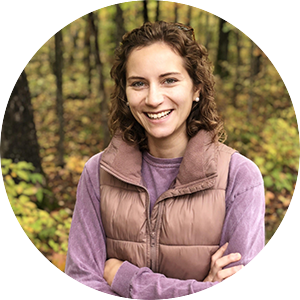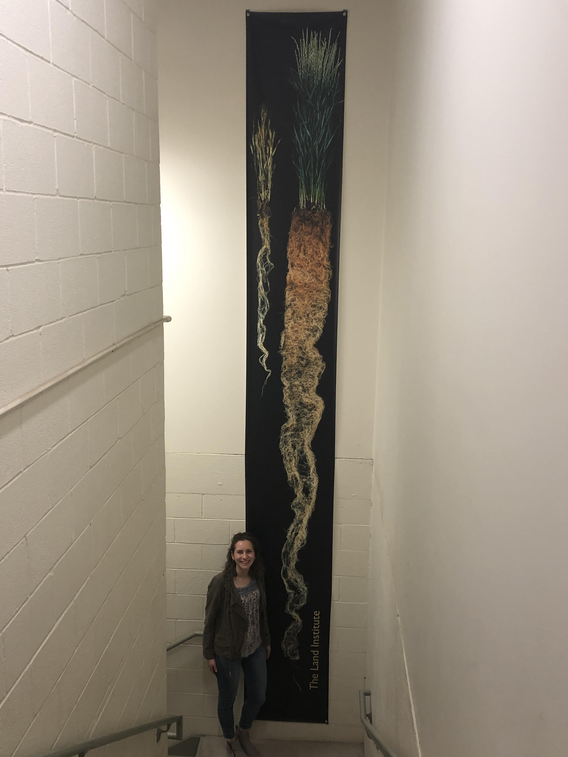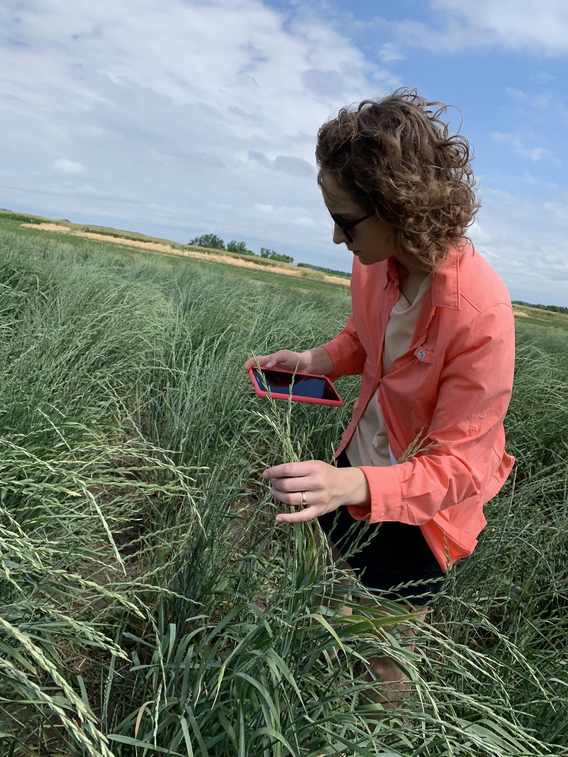
Student Profile: Hannah Stoll

Agronomy and plant genetics doctoral student Hannah Stoll maintains an extensive level of involvement at the Plant Breeding Center because of her deep interest in the work they do. Learn a bit about her in this Q&A that touches on her past work experiences, research goals, and career aspirations.
What has been your academic path and what degree are you currently seeking?
I’m from a small town in east central Illinois near Champaign-Urbana – Mahomet, Ill – and completed my BS at the University of Illinois at Urbana-Champaign in crop sciences with an emphasis on plant biotechnology and molecular biology. Then, I did my MS at the University of Nebraska-Lincoln in plant breeding and genetics, specifically hybrid wheat breeding. Now, I'm pursuing my doctorate in applied plant sciences with a focus on plant breeding and genetics, specifically in intermediate wheatgrass – or Kernza® – breeding.

What experiences led you to choose plant breeding at the University of Minnesota?
As I was finishing up my bachelor of science degree, I knew I wanted to pursue graduate school, and I was actively interested in the UMN – I even applied and got accepted. For a number of reasons, I decided on Nebraska for my MS; however, the opportunities at the UMN were always on my radar. As I completed my MS, the Forever Green Initiative was one of these unique opportunities, and there really isn’t another initiative in the U.S. quite like it. I decided it was time to shift gears and focus my attention on breeding a new crop with the potential to improve both the economic and environmental sustainability of farms in the U.S.
Tell us about your research and how you expect it to be used.
My PhD research aims to assess the amount of breeding progress we've made for intermediate wheatgrass, also known as IWG – whose trademarked name is Kernza® – at the University of Minnesota. Some key traits we're trying to improve are grain yield, seed size, and resistance to shattering. In addition to quantifying this progress, I will also be looking into what regions of the genome are associated with these key domestication traits. Identifying these genomic regions gives breeders the ability to better select parents for future generations of IWG breeding —meaning faster progress!
How has the formation of the Plant Breeding Center affected your research or course of study?
I served as the first program coordinator for the Plant Breeding Center, meaning I had the privilege of planning some of our first events — workshops, online seminars, a summer retreat, and the summer institute. In addition to this role being excellent professional development, several of these events have been great opportunities to learn new research skills, connect with scientists in other parts of the world, and better connect with researchers at my own institution. Additionally, I’ve served as a member of the Vegetable Breeding for Immigrant Farmers Working Group. Working with community members, farmers, master gardeners, and University of Minnesota Extension agents on this project has been an incredible learning opportunity, and also piqued my interest in participatory breeding as a future career opportunity.

What is your career goal, and how did you choose it?
I’m keeping an open mind, but my primary motivation for completing my PhD is the desire to educate in some capacity in my future career. I am passionate about breeding new, sustainable cropping systems. Ideally, I’d like to apply my skill sets in both education and plant breeding for new systems to directly serve my community.
What is your advice to a student interested in studying plant breeding?
I think it’s important to gain experience working with plants and data in an internship! Working with a lab on campus or applying for an industry internship is great exposure to some of the careers available at the BS, MS, and PhD levels. I did a 6-month co-op with DuPont Pioneer – now Corteva™ Agriscience – during my undergrad, and it was a great opportunity to see the “behind the scenes” of a plant breeding operation.
What’s a little-known fact about you?
I love to garden and beautify with landscaping (which isn't that unique for folks in this field), and I have 15 different bearded iris accessions growing in the backyard of my rental house.The pipe dream is to make some crosses and grow them out for a little backyard breeding project!
You can read the full interview in the 2023 Plant Breeding Center Year in Review (.pdf) where it was originally published.





